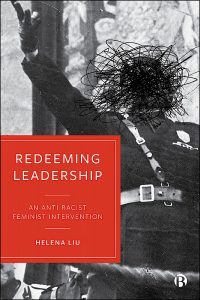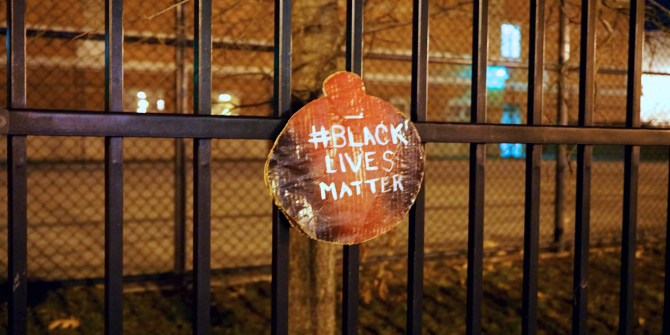In Redeeming Leadership: An Anti-Racist Feminist Intervention, Helena Liu critiques and seeks to dismantle celebrated leadership narratives that draw from and protect systems of oppression rooted in imperialism, white supremacy, neoliberal capitalism and patriarchy in order to consider more substantive actions for institutional and societal change. This is a timely, thought-provoking and hopeful read recommended to all those who wish to reimagine leadership away from the confines of oppression and learn how to practise true allyship, finds Ellen Frank Delgado.
Redeeming Leadership: An Anti-Racist Feminist Intervention. Helena Liu. Bristol University Press. 2020.
 I was drawn to Helena Liu’s first book initially due to the title, Redeeming Leadership: An Anti-Racist Feminist Intervention. For me, the title provokes images of middle management being held against their will in a 36-hour-long mandatory workplace training session, most likely held in a windowless room on an especially dreich Monday morning. Human resources professionals offer well-intentioned, but surface-level, gestures, like handing out t-shirts reading ‘This is what a feminist looks like’ or pens imprinted with #BLM. Unsurprisingly, Liu’s book is infinitely more engaging than any such intervention, carefully considering substantive actions for institutional change. Liu offers a timely and thought-provoking analysis of leadership as we know it. Accessible for academics and non-academics alike, Liu both critiques and shares how to dismantle celebrated leadership narratives rooted in imperialism, white supremacy, neoliberal capitalism and patriarchy.
I was drawn to Helena Liu’s first book initially due to the title, Redeeming Leadership: An Anti-Racist Feminist Intervention. For me, the title provokes images of middle management being held against their will in a 36-hour-long mandatory workplace training session, most likely held in a windowless room on an especially dreich Monday morning. Human resources professionals offer well-intentioned, but surface-level, gestures, like handing out t-shirts reading ‘This is what a feminist looks like’ or pens imprinted with #BLM. Unsurprisingly, Liu’s book is infinitely more engaging than any such intervention, carefully considering substantive actions for institutional change. Liu offers a timely and thought-provoking analysis of leadership as we know it. Accessible for academics and non-academics alike, Liu both critiques and shares how to dismantle celebrated leadership narratives rooted in imperialism, white supremacy, neoliberal capitalism and patriarchy.
Liu’s arguments develop over the course of eight chapters divided into two main parts: the violences of leadership; and anti-racist feminist redemption. Throughout the book, Liu draws on her own experiences working in academic institutions, her extensive critical leadership research as well as commonly accepted grand tales of white leadership. It is the latter that most powerfully forces readers to stop and analyse how leadership draws from and protects systems of oppression.
Liu offers solemn reminders of the overt hate and violence expressed by some of the most dominant, controversial and golden blonde world leaders, but also highlights how covert violence is perpetuated by celebrated and memorialised leaders too. Her argument is reminiscent of the work of sociologists Donald Tomaskovic-Devey and Dustin Avent-Holt who build on Charles Tilly’s categorical inequality theory to develop relational inequality theory. One critical aspect of relational inequality theory is the covertness of systems of oppression in maintaining social hierarchies within institutions. Legislation such as the US Civil Rights Act of 1964 led discrimination to become more discreet (Douglas S. Massey, 2008). Oppression within and upheld by leadership narratives, as Liu argues, is no different (Tomaskovic-Devey and Avent-Holt, 2019; Massey, 2008). Liu hints at this covertness at times and specifically calls it out when she critiques normalisation, whereby whiteness ‘silently imposes itself as the standard’ (31).
Yet, as discreet as oppressive leadership is, it is hard to enter any bookstore without noticing entire sections devoted to self-help leadership books catering to the young, white, able-bodied, cisgender man. As Liu points out, oftentimes the prevailing narrative, regardless of author or academic theory, is one in which leadership is a gene inherited by the visionaries, the hard workers and the intellectuals with unwavering and unstoppable brilliance. Liu is blunt and unforgiving in her questioning of why, in the Western world, do we so zealously accept the tales of white ’heroic’ leaders? If leadership is socially constructed, as Liu argues, why do we construct it in a way that reinforces hierarchies built by neoliberalism, patriarchy, imperialism and white supremacy?

This is the crux of Liu’s argument. Leadership, as it is known and practised today, has a firm foundation in these systems of oppression and therefore also protects these very same systems. Take the late black-turtleneck-wearing visionary Steve Jobs and how the grand tales of his success replicate a neoliberal narrative. The ways his ‘rags-to-riches’ story is spun ‘[…] disregard structures of inequality and histories of oppression, and reduce collective responsibilities onto the individual’ (5). In such narratives of success, the leader figure prevails all on his lonesome.
In Chapter Two, Liu reminds readers that her book is less about critiquing the visionary man, fuelled solely by his feverish pursuit of knowledge, or any one CEO. Instead, it is a critique of the narrative of leadership perpetuated not just by white, cisgender, able-bodied men, but also women engaging in neoliberal, white supremacist, imperialist fantasies too. As Liu reflects, ‘patriarchy […] has no gender’ (26). Similarly, women leaders oftentimes perpetuate whiteness through ‘rituals of exclusion’ (59). This argument is once again reminiscent of relational inequality theory, whereby social hierarchies are maintained through three main mechanisms: claims-making, exploitation and social closure (Tomaskovic-Devey and Avent-Holt, 2019).
Claims-making is when an individual can secure more resources or a position of power more easily due to their identity, while exploitation allows an individual to unfairly take away from others’ resources due to unjust power differences (Tomaskovic-Devey and Avent-Holt, 2019). Social closure involves in-groups hoarding their power and resources away from groups that do not share their identity (opportunity hoarding), as well as blatantly excluding out-groups from the same potentially narrative-altering power and resources (Tomaskovic-Devey and Avent-Holt, 2019).
Liu shares an experience from her own professional life in academia, where white colleagues would ask for fewer migrant students in their classes on the basis of perceived language comprehension. This covert, and as Liu puts it ‘natural’, pattern of exclusion is a strong example of how outright exclusion is becoming increasingly unacceptable, but opportunity hoarding is still a culturally acceptable form of social closure (59; Tomaskovic-Devey and Avent-Holt, 2019). In much the same way, given leadership is the outcome of power allocation, it is only logical that the power transfer from white men to Lean In white women in leadership hardly challenges the conventional leadership narrative. After all, it is still the in-group opportunity hoarding by and for whiteness. Together, these mechanisms result in vicious leadership cycles participating in, and therefore protecting, neoliberal capitalism, white supremacy, patriarchy and imperialism.
In the second part of the book, Liu shares her vision for redeeming leadership and how we are routinely getting it wrong. As Douglas S. Massey writes, ‘discrimination moved underground’, and Liu rightfully questions why, despite this, we are still pretending that redeeming leadership is a surface-level numbers game. Liu eloquently reflects:
If commanding a Fortune 500 corporation involves subjugating employees, exploiting workers, and resources in the Global South, dispossessing Indigenous people of their land, and contributing to the degradation of the environment, then simply having a woman or a person of colour at the helm would be unlikely to alleviate the violences of leadership (23).
Inspired by the work of Audre Lorde and bell hooks, Liu also critiques the misapplication of Kimberlé Crenshaw’s theory of intersectionality to organisational practices. Liu maintains that redeeming leadership is not about exhausting neverendingly niche identity political debates either. Rather, Liu’s secret sauce for redeeming leadership is acknowledging and dismantling the interlocking systems of oppression by decolonising our minds, relating with others and reimagining leadership.
Decolonising our minds is a practice directly pulled from hooks, whereby individuals must reject the dominators’ values to create an internal safe space for self-acceptance. Only then can one also hold space for the true acceptance of others as they are. Relating with others involves active allyship, where recognising and working together across differences decentres the dominator’s identity. Finally, reimagining leadership similarly decentres any one individual or identity to refocus leadership on the spaces and relations between people. In doing so, a collaborative leadership emerges and this will inherently guide social justice initiatives more readily than traditional leadership narratives rooted in the individual.
With the social justice summer of 2020 carrying us through to 2021, Liu urges us to not just reconsider, but completely reimagine, leadership narratives that do not continue to fortify systems of oppression. This self-imposed intervention will not be easy. Oppressive leadership narratives are engrained in our universal psyches from the white knight storybooks we read as children to the mandatory case study readings in higher education to the Oscar-winning movies about Harvard dropouts we leisurely watch. In one especially sorrowful and candid footnote, Liu reflects, ‘I wonder if those who dominate assume that everybody strives for domination’ (105). Even so, Liu’s publication presents a highly recommended and hopeful read for all who wish to practise true allyship and urgently free leadership from the confines of oppression.
- This article originally appeared at the LSE Review of Books.
- Image Credit: Photo by Christina @ wocintechchat.com on Unsplash.
Please read our comments policy before commenting.
Note: This article gives the views of the authors, and not the position of USAPP– American Politics and Policy, nor of the London School of Economics.
Shortened URL for this post: https://bit.ly/3ftG8Uz
About the reviewer
Ellen Frank Delgado – University of Edinburgh
Ellen Frank Delgado is a doctoral candidate at the School of Social and Political Science, University of Edinburgh and an affiliate PhD of the UoE Centre for Data, Culture, and Society. She holds an MSc. in Human Capital Management (Columbia University) and a BSc. in Human and Organisational Development (Vanderbilt University). Her doctoral research focuses on applying computational social science methodologies to quantify workplace inclusion of historically marginalised groups.






